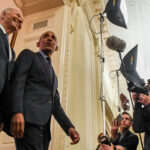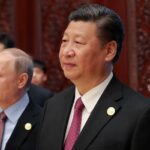In an impassioned address to the United Nations Security Council Tuesday, Ukrainian President Volodymyr Zelenskyy laid down the gauntlet — urging the U.N.’s most powerful body to either act or “dissolve yourself altogether.”
It was a challenge to the world’s diplomats sitting in the historic chamber in New York, where any action to even condemn Russia’s invasion has been blocked by Russia’s veto power as a permanent member of the U.N. Security Council.
But it was also a searing indictment of the U.N. system itself, created in the ashes of World War II to ensure international peace and security.
U.N. aid agencies are on the ground providing assistance, its human rights chief is monitoring reported war crimes, including new, shocking images of murdered civilians in the Kyiv suburb of Bucha, and nearly three-fourths of its members have joined to condemn Russia’s invasion.
But none of that has stopped Russian leader Vladimir Putin’s brutal campaign to topple the Ukrainian government and subjugate the country,
MORE: Residents of Bucha recount horrors: ‘I recognized him by his sneakers’
“Where is the security that the Security Council needs to guarantee?” Zelenskyy asked. “It is obvious the key institution of the world … simply cannot work effectively.”
Top U.N. officials attended the session Tuesday, including Secretary-General Antonio Guterres, who lamented how the war was now fueling food and fuel crises and threatening to throw more people around the world into hunger.


“For all these reasons, it is more urgent by the day to silence the guns. … The war in Ukraine must stop — now,” he told the chamber.
But weeks of condemnation by Guterres and other U.N. diplomats have fallen on deaf ears in Moscow, which continues to use its prominent perch on the Security Council to spread disinformation about the war and accuse Ukraine of provocations, lies, and fakes. On Tuesday, its envoy Vasily Nebenzya again spoke repeatedly to say the atrocities reported by eyewitnesses and journalists in Bucha were “staged.”
MORE: Biden calls Russia’s killing of Ukrainian civilians a war crime but not genocide
The failure to reproach Nebenzya for his near daily false claims is yet another way the U.N.’s credibility has taken a hit during the crisis, according to some critics.
In his remarks, Zelenskyy himself said the U.N. could be “simply closed” if it doesn’t act to punish Russia for its invasion of his country — “if there is nothing that you can do besides conversation.”
U.S. Ambassador to the U.N. Linda Thomas-Greenfield pushed back on that gently in an interview after the session, telling the BBC Zelensky “is not exactly right.”
“No one can question his frustration with the council and how the council operates. The Russians do have veto power. But I have said over and over again — they cannot veto our voices, they can’t veto his voice,” Thomas-Greenfield said.


But Zelenskyy made clear that for Ukraine, that is not enough.
He demanded that “the Russian military and those who gave them orders must be brought to justice immediately” — urging for “complete truth and full accountability.” As he detailed horrific atrocities in Bucha and elsewhere – he said worse is yet to be discovered in the cities still held by Russian forces.
But he also called for wholesale reform of the U.N. system — saying that the international body has not lived up to the goals set out at its founding in San Francisco after World War II, and that those goals cannot be reached without reforms. He called for Russia to be expelled from the Security Council or for it to be reformed at a global conference, including ending the veto power.
MORE: ‘Women were raped and killed in front of their children,’ Zelenskyy tells UN
“The veto is not the right to die,” he added. “No more exceptions or privileges.”
There is no effort underway to expel Russia from the Security Council or the General Assembly, the U.N.’s main chamber — where all 193 countries have a vote, but whose resolutions are non-binding. An expulsion from the U.N. requires a recommendation from the Security Council itself — where Russia wields that veto power — and then a vote by the General Assembly.
That veto power — shared with the four other permanent members China, the U.S., the United Kingdom, and France — has rendered the Security Council powerless to even pass a resolution condemning the Kremlin’s invasion.


Either way, Putin seems to care little for paper condemnations like U.N. resolutions. The night he launched his war and the bombs started to fall across Ukraine, U.N. diplomats were meeting at the same time in New York late at night to discuss the threat of war, their words ringing even more hollow.
Instead of fully expelling Russia, the U.S. is pushing with its allies and partners, including Ukraine, to suspend Russia from the U.N. Human Rights Council. The body’s 47 members are elected among U.N. member states for three-year terms, but a country can be suspended with a two-thirds majority vote in the U.N. General Assembly.
“Our votes can make a real difference. Russia’s participation in the U.N. Human Rights Council hurts the council’s credibility, it undermines the entire U.N., and it is just plain wrong. Let us come together to do what is right and do right by the Ukrainian people,” Thomas-Greenfield told her fellow diplomats in the chamber.
U.S. officials have said they believe they have the votes necessary — pointing to two previous resolutions passed by the General Assembly to condemn Russia’s invasion with 141 and 140 votes, respectively. A vote could be held as soon as Thursday, Thomas-Greenfield said.
While only one other country has faced that kind of censure — Libya in 2011 after Muammar Gaddafi’s forces opened fire on protesters — Russia has already dismissed the efforts, with Nebenzya vowing nothing will stop the Kremlin’s campaign.
“We need to cut out the malignant Nazi tumor that is consuming Ukraine and would in time begin to consume Russia, and we will achieve that goal, I hope sooner rather than later, because there is no other outcome,” he said.
Zelenskyy challenges UN to punish Russia or ‘simply close’ its doors: ANALYSIS originally appeared on abcnews.go.com




